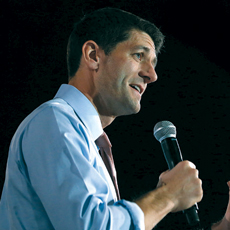
Fresh off his tax reform victory, Speaker Paul Ryan (R-WI) said Wednesday that Medicare reform won’t be a focus for Republicans this spring despite a rash of Democratic warnings about major cuts to the program.
Instead, Ryan said the focus next year will be on welfare reform.
“Do we want to get entitlement reform? Of course we do, but the kinds of entitlement reforms I think that we’re going to be pursuing are the kinds that help make sure we get people get from welfare to work,” Ryan said on ABC. “That’s what really we’re focused on this spring.”
Still, Ryan would not rule out some changes to Medicare. The Hill reported Democrats remain worried about Ryan’s desire to overhaul Medicare and shift to more private insurance.
But Ryan indicated he will not aim for broad overhaul in 2018, an election year in which Republicans will be fighting to keep their majority. He instead mentioned reforming Medicare payments.
“There are some provider issues that we may be addressing as, you know, some providers in the Medicare field in some cases are getting overpaid, we want to make sure that that’s being dealt with, but as far as talking about beneficiaries, we’re not focused on that, we’re focused on getting people from welfare to work,” Ryan said.
But Medicare could be in trouble even without Ryan’s specific attention.
Several Republicans made the media rounds Wednesday, promising they won’t let $1.5 trillion in mandated funding cuts go into effect next year now that tax reform has passed. The so-called PAYGO act automatically triggers those cuts to specific programs — including $25 billion to Medicare — but Republicans have promised they’ll get the votes needed to pass a waiver.
House Majority Leader Kevin McCarthy (R-CA) told CNBC Wednesday that dire warnings of big Medicare cuts from Democrats are “more of a fear of what the Democrats are trying to spread out.”
A White House economic adviser said Wednesday that President Donald Trump might not sign the tax bill until after that waiver is approved by Congress.
LeadingAge CEO Katie Smith Sloan maintained the bill was “ill-conceived,” although members were pleased to see the medical expense deduction and tax-exempt private activity bonds restored in the final version.
Now, the concern turns to the impact the bill will have on the federal budget and the availability of resources for Medicaid, Medicare and senior housing.
The Center for Medicare Advocacy and The Medicare Rights Center said in a statement that the addition of nearly $1.5 trillion to the deficit puts those programs directly in the cross-hairs of policy-makers.
“Congressional leaders have been clear — after passing a costly tax bill that drives up deficits, they will use these higher deficits to justify cuts to programs like Medicare,” the centers said.




